-
Monday, 19 June 2023 Sabatini Building, Auditorium and online platform
Southern Europe on the Colonial Horizon of Western Modernity
— By Walter Mignolo
Online platformSpain’s position in the modern/colonial global order is unique and entails a discussion around multiple “souths” and “norths”. Although Spain was a key agent in the construction of colonial power in the sixteenth century, at the end of the eighteenth century it lost the pomp of modernity and was relegated to Southern Europe — the first transformation in the colonial pattern of power, subsequently managed by France, England and Germany. At that juncture, the invention of Southern Europe coincided, temporally and conceptually, with Orientalism. Mignolo looks to untangle the specific paradigm of Iberian and Spanish space in these constellations and what this mixed-race and Creole place, at once colonising and colonised, tells us about the colonial pattern of power.
-
Tuesday, 20 June 2023 Sabatini Building, Auditorium and online platform
Traces of Violence. The German Empire in South-West Africa
— By Marcelo Brodsky
Online platformThe twentieth century’s first genocide was committed by the German empire between 1904 and 1908 in South-West Africa — Namibia today. This genocide targeted Nama and Herero ethnic groups, Indigenous peoples from the region, within a context of European powers dividing Africa at the Berlin Conference (1884–1885). As in his previous works, Brodsky focuses on the way in which this crime against humanity is remembered and comprehended from specific research work and the recreation of photographic archives.
-
Tuesday, 20 June 2023 Sabatini, Auditorium and online platform
Time and Friendship. A Conversation on Aníbal Quijano
— By Rita Segato and Walter Mignolo
Online platformA conversation on the life and thought of Aníbal Quijano, with whom both worked, and, more specifically, on his theory and practice of friendship. Quijano believed friendship holds a central place as a mode of doing in an intrinsic union between experience and thought. Setting out from this evocation, it is possible to examine other contemporary questions linked to the inheritance and validity of decolonial thought. In facing today’s geopolitical transformations, for instance the emergence of possible de-racialised capital as a result of China’s current economic dominance or before the climate crisis and global energy emergencies, there is a need to question the generativity of the emancipatory potential of Quijano’s decolonial project.
-
Tuesday, 20 June 2023 Sabatini Building, Auditorium
A Dream Is Life
— A performance by the Teatro Sin Papeles company
El sueño es vida (A Dream Is Life) is a monologue by Thimbo Samb, produced by Teatro Sin Papeles and written and directed by Moisés Mato López. In the work, Samb touches on his migrant life path — dreams are life because they move feet and hands along the way and in tasks deemed necessary. The piece prompts us to read his experience in relation to La vida es sueño (Life Is a Dream), a baroque drama by Calderón de la Barca, thereby setting up a dialogue with the opposition and duality between free will and predestination, and between reality and dreams. Together with this performance, in conjunction with World Refugee Day (20 June), different awareness-raising activities against border violence will be held and implemented by Red Solidaria de Acogida (The Refuge Solidarity Network) and the Museo Situado assembly, spotlighting the southern border (Ceuta and Melilla) where tragic events such those in Tarajal on 6 February 2014 and in Melilla on 24 June 2022 set in motion a campaign against neglecting justice and repair.
-
Wednesday, 21 June 2023 Nouvel Building, Auditorium 200 and online platform
Geography of Roots. An Epistemology of the Individual
— By Rita Segato
Online platformIn this lecture, Rita Segato proposes an understanding of roots as the last space of resistance before the commodification and privatisation of space and territory, characteristic of neoliberalism. If the anthropological base of community is its affective, imaginary, symbolic, aesthetic and sensitive connection to a specific space and irreplaceable in its uniqueness, then the denomination of these links makes territory sacred and constitutes powerful and invisible lines of resistance to capital’s needs. Opposite the imperial logics of urban planning and rural colonisation, based on the de-characterisation and continuous mobilisation of spaces, and before the major migratory and ecological crises that are commonplace in the current context, Segato defends the geographies of the soul of Indigenous peoples, their micro-toponomy and non-replicability, as a trench and a bridge with the past which survives in community.
![Primer mapamundi chino al estilo europeo. Matteo Ricci, Kunyu Wanguo Quantu (坤輿萬國全圖) [Un mapa de la miríada de países del mundo], 1602](https://recursos.museoreinasofia.es/styles/large_landscape/public/Actividades/catedra-anibal-quijano-snippet.png.webp)
Held on 19 Jun 2023
The Aníbal Quijano Chair is a space of thought which pays homage to the memory of the great Peruvian thinker, a critic of the coloniality of power, and seeks to open a channel of collective reflection-action to incorporate it into the multiple viewpoints that today discover modernity deprived of its primal pledges.
This fifth edition, on the relationship between coloniality, memory and space, constitutes an enquiry on friendship and roots, drawing from Aníbal Quijano’s life and human experience. In his world of situated friendship, with the specific Andean spatial temporality, he represents a unique way of being in the world, giving rise to modes and powers of decolonial thought. Eager to avoid dissociating human experience and politics, the edition looks to reflect on the relationship between people, spaces and affects as a place of critical formulation and resistance inside the current ecological and geopolitical context, and from encounters and stage practices which centre bodies and territories.
The programme gets under way with a lecture by Walter Mignolo — one of the great decolonial thinkers, and a friend and successor of Quijano’s thought — with respect to the myriad dimensions of coloniality within the context of Spain. It continues with an encounter with photographer Marcelo Brodsky on the twentieth century’s forgotten holocausts and the relationship between the image and the idea of south, and a conversation between Mignolo and Rita Segato in relation to the validity of Quijano’s thinking in the present day. Furthermore, in conjunction with World Refugee Day, the Teatro Sin Papeles company presents the performance El sueño es vida (A Dream Is Life). The Chair concludes with another master lecture, this time delivered by Segato as she discusses her latest research project concerning roots and their consequences.
Curator
Rita Segato
Organised by
Museo Reina Sofía and Museo Situado
Programme
Inside the framework of
Educational program developed with the sponsorship of

Participants
Marcelo Brodsky is an artist and human rights activist who lives and works in Buenos Aires. After the 1976 coup d’état in Argentina, Brodsky sought exile in Barcelona, where he studied Economy at the University of Barcelona and Photography in the International Centre of Photography, and was taught by Catalan photographer Manel Esclusa. Situated at the limit between installation, performance, photography, monument and memorials, his works combine text and image and are part of the collections of, among other centres, the Metropolitan Museum of Art in New York, the Museo Nacional de Bellas Artes de Argentina and, recently, the Museo Reina Sofía.
Walter Mignolo is a semiotician and professor of Literature at Duke University. He worked alongside Aníbal Quijano and is one of the main successors of his thought. Over the past thirty years, he has devoted his research and work as a teacher to explaining and unmasking the historical pillars of what he defines as “modernity/coloniality”. In The Darker Side of Western Modernity. Global Futures, Decolonial Options (1995), he argues that coloniality has been constitutive and not derivative of modernity since its birth in 1500. Further, given that this cycle of coloniality is reaching its end, he focuses debate on the “postcolonial condition” with The Idea of Latin America (2005).
Teatro Sin Papeles is a company which was created in 2018, welcoming actresses and actors with migrant backgrounds to share their lives through theatre. Since it was founded, the company has activated different performances in cultural spaces linked to its surrounding reality, such as Teatro del Barrio (Lavapiés, Madrid) and Ateneu del Raval (Barcelona). Thimbo Sam is an actor and activist who reached Spain in a dugout canoe at sixteen years of age and faced a difficult life overcoming obstacles to reach one goal: to make his dream of becoming an actor a reality. He has participated in short films, documentaries, films and series.
Rita Segato is a professor of Anthropology and Bioethics in the UNESCO Chair at the University of Brasilia (Brazil). She was an expert witness on the trials of the Sepur Zarco case in Guatemala, where sexual violence was first tried and prosecuted, in the form of domestic and sexual slavery, as a war strategy used by the State. Her main fields of interest include new forms of violence against women and the contemporary consequences of the coloniality of power. Among her most important works are La Nación y sus Otros: raza, etnicidad y diversidad religiosa en tiempos de políticas de la identidad (Prometeo Libros, 2007) and La crítica de la colonialidad en ocho ensayos y una antropología por demanda (Prometeo Libros, 2013). She has directed the Aníbal Quijano Chair on decolonial thought in the Museo Reina Sofía since 2015.
![Primer mapamundi chino al estilo europeo. Matteo Ricci, Kunyu Wanguo Quantu (坤輿萬國全圖) [Un mapa de la miríada de países del mundo], 1602](https://recursos.museoreinasofia.es/styles/large_landscape/public/Actividades/catedra-anibal-quijano-snippet.png.webp)
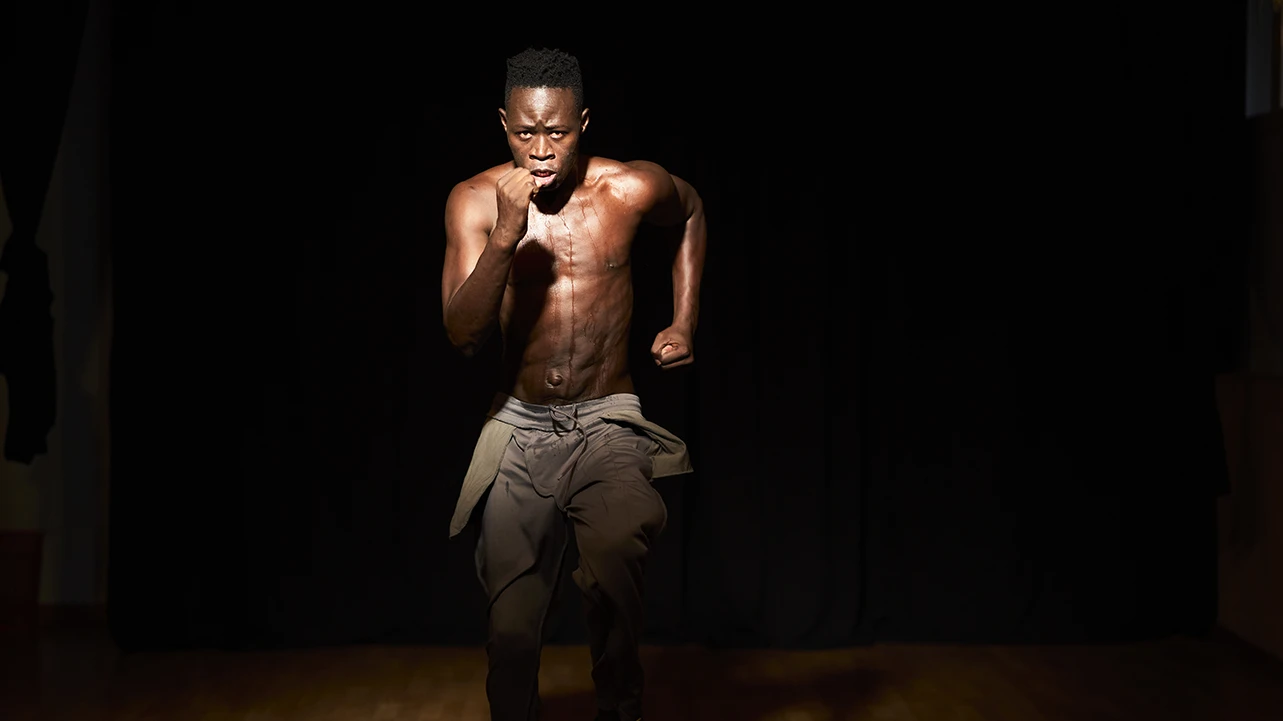
Más actividades

Difficulty. Forms and Political Effects of Deviation in Writing and Contemporary Art
23 February – 14 December 2026 – Check programme
Difficulty. Forms and Political Effects of Deviation in Writing and Contemporary Art is a study group aligned towards thinking about how certain contemporary artistic and cultural practices resist the referentiality that dominates the logics of production and the consumption of present-day art. At the centre of this proposal are the concepts of difficulty and deviation, under which it brings together any procedure capable of preventing artistic forms from being absorbed by a meaning that appears previous to and independent from its expression. By ensuring the perceptibility of their languages, difficulty invites us to think of meaning as the effect of a signifying tension; that is, as a productive and creative activity which, from the materiality of art objects, frees aesthetic experience from the representational mandate and those who participate in it from the passiveness associated with tasks of mimesis and decoding.
The economy of the referential norm translates the social logic of capitalism, where insidious forms of capturing subjectivity and meaning operate. In the early 1980s, and adopting a Marxist framework, poet Ron Silliman highlighted how this logic entailed separating language from any mark, gesture, script, form or syntax that might link it to the conditions of its production, rendering it fetichised (as if without a subject) and alienating its users in a use for which they are not responsible. This double dispossession encodes the political strategy of referential objectivity: with no subject and no trace of its own consistency, language is merely an object, that reality in which it disappears.
The political uses of referentiality, more sophisticated today than ever before, sustain the neoliberal-extractivist phase of capitalism that crosses through present-day societies politically, economically and aesthetically. Against them, fugitive artistic practices emerge which, drawing from Black and Queer studies and other subaltern critical positions, reject the objective limits of what exists, invent forms to name what lies outside what has already been named, and return to subjects the capacity to participate in processes of emission and interpretation.
Read from the standpoint of artistic work, the objective capture of referentiality may be called transparency. Viewed from a social contract that reproduces inequality in fixed identity positions, transparent in this objectivity are, precisely, the discourses that maintain the status quo of domination. Opposite the inferno of these discourses, this group aims to collectively explore, through deviant or fugitive works, the paradise of language that Monique Wittig encountered in the estranged practices of literature. For the political potency of difficulty — that is, its contribution to the utopia of a free language among equals — depends on making visible, first, its own deviations; from there, the norm that those deviations transgress; and finally, the narrowness of a norm which in no way exhausts the possibilities ofsaying, signifying, referring and producing a world.
From this denouncement of referential alienation, fetishisation and capture, Difficulty. Forms and Political Effects of Deviation in Writing and Contemporary Art turns its attention to the strategies of resistance deployed by contemporary artists and poets. Its interest is directed towards proposals as evidently difficult or evasive as those of Gertrude Stein, Lyn Hejinian, Theresa Hak Kyung Cha, Kameelah Janan Rasheed, Kathy Acker, María Salgado and Ricardo Carreira, and as seemingly simple as those of Fernanda Laguna, Felix Gonzalez Torres and Cecilia Vicuña, among other examples that can be added according to the desires and dynamics of the group.
The ten study group sessions, held between February and December, combine theoretical seminars, work with artworks from the Museo Reina Sofía’s Collections and exhibitions, reading workshops and public programs. All these formats serve as spaces of encounter to think commonly about certain problems of poetics — that is, certain political questions — of contemporary writing and art.
Difficulty. Forms and Political Effects of Deviation in Writing and Contemporary Art inaugurates the research line Goodbye, Representation, through which the Museo Reina Sofía’s Studies Directorship seeks to explore the emergence of contemporary artistic and cultural practices which move away from representation as a dominant aesthetic-political strategy and redirect their attention toward artistic languages that question the tendency to point, name and fix, advocating instead for fugitive aesthetics. Over its three-year duration, this research line materializes in study groups, seminars, screenings and other forms of public programming.

CLINIC 2628. A Community of Writing and Research in the Arts
February – October 2026
Clinic 2628 is a project which supports and brings together writings which stem from the intention to offer a space and sustainable time for research work in art and culture. Framed within an academic context which is increasingly less receptive to the forms in which thinking happens and is expressed, the aim is to rescue the academic from its neoliberal trappings and thus recover the alliance between precision and intuition, work and desire. A further goal is to return writing to a commons which makes this possible through the monitoring of processes and the collectivisation of ideas, stances, references and strategies.
The endeavour, rooted in a collaboration between the Museo Reina Sofía’s Studies Directorship and the Artea research group, via the i+D Experimenta project, is shaped by three annual editions conceived as spaces of experimentation, discussion and a demonstration of writings critical of what is put forward by today’s academia.
What forces, forms and processes are at play when writing about art and aesthetics? In academia, in museums and in other cultural institutions, the practice of writing is traversed by productivist logics which jeopardise rhythms of research and experimentation. The imposition of both scientism inherent in the structure of “the paper” and the quantifying of results which demand a criterion of quality and visibility sterilise and smoothen, from the outset, the coarseness that is particular to writing understood from the concrete part of language: phonic, graphic, syntactic and grammatical resistance connecting the language user to the community the language unites and activates. They also sterilise the roughness enmeshed in the same desire to write, the intuitive, clear and confusing pathways that once again connect the writer to those reading and writing, participating in a common good that is at once discovered and produced.
The progressive commercialisation of knowledge propelled by cognitive capitalism moves further away from the research and production of knowledge in artworks and artistic languages and practices. The work of curators and archive, criticism, performances and essays formerly saw a horizon of formal and emotional possibilities, of imagination that was much broader when not developed in circumstances of competition, indexing and impact. Today, would it be possible to regain, critically not nostalgically, these ways; namely, recovering by forms, and by written forms, the proximity between art thinking and its objects? How to write in another way, to another rhythm, with no more demands than those with which an artwork moves towards different ways of seeing, reading and being in the world?

Cultural Work
Thursday, 12 February 2026 – 5:30pm
This series is organised by equipoMotor, a group of teenagers, young people and older people who have participated in the Museo Reina Sofía’s previous community education projects, and is structured around four themed blocks that pivot on the monstrous.
Session number two looks to approach film as a place from which cultural work is made visible and processes of production engage in dialogue with artistic creation. From this premise, the session focuses on exploring how audiovisual content is produced, assembled and distributed, from the hands that handle the images to the bodies that participate in its circulation. The aim is to reflect on the invisible effort, precarity and forms of collaboration that uphold cultural life, that transform the filmic experience into an act that recognises and cares for common work.
![Basel Abbas y Ruanne Abou-Rahme, At Those Terrifying Frontiers Where the Existence and Disappearance of People Fade Into Each Other [En esas fronteras aterradoras donde la existencia y la desaparición de personas se disuelven entre sí], 2019](https://recursos.museoreinasofia.es/styles/small_landscape/public/Colecci%C3%B3n/abbasabourahme.png.webp)
Gaza and Aestheticide
Tuesday February 10, 2026 – 16:00 h
This seminar examines the systematic destruction of Palestinian collective sensibility — what we might call “aestheticide” — that has accompanied Israel’s genocide and ecocide in Gaza, and considers the conditions of artistic practice in its aftermath. Over more than two years, the demolition of universities, archives, museums, and libraries has not only erased cultural and intellectual infrastructure but has also targeted the very possibility of representation itself. The destruction of a people has been accompanied by the destruction of their image, their history, and their capacity to be known: reportage, scholarship, and cultural memory have been deliberately undermined, with media institutions, universities, and museums often complicit in this repression. Gaza consequently functions as a rehearsal space for a possible global future — of fascism, post-liberal authoritarianism, militarized borders, and AI-enabled warfare —, a laboratory for an emerging world order. What, then, becomes of critical analysis and resistance under these conditions? And what becomes of aesthetics and politics?
This three-hour seminar engages in dialogue with a broader line of work on the climate emergency and decolonial perspectives developed within the Museum of the Commons project (2023–2026) of the L’Internationale network, of which the Museo Reina Sofía is a member; as well as with some of the questions that animate the study group Aesthetics of Peace and Desertion Tactics. Finally, it is also embedded in a wider strategy of support for and commitment to the artistic and discursive practices of Palestinian artists and cultural practitioners, most clearly reflected in the TEJA network.
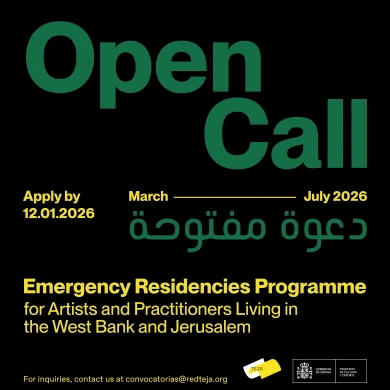
TEJA 2026. Open Call for Emergency Art Residencies
Proposal submission until 12 January, 2026
TEJA / Red de espacios culturales en apoyo a situaciones de emergencia [Network of Cultural Spaces in Support of Emergency Situations] has the mission to promote transnational cooperation by offering temporary art residencies to artists and cultural practitioners who find themselves in complex socio-political situations in their countries of origin. During their stay in Spain, residents receive accommodation, legal and psychological counseling, and access to a network of organizations and professionals with whom they can share, develop, and continue with their creative projects. The goal is to provide a safe and stimulating environment where artists can continue their work despite adverse circumstances and generate dialogue spaces that ensure freedom of expression through joint activities both in Spain and with international collaborators.
During 2026, TEJA hosts three new residencies, each lasting three months, dedicated to supporting artists and cultural practitioners residing in the West Bank and Jerusalem. In addition, in the second half of the year, TEJA hosts three additional residencies for Gazan artists, which are offered by invitation (as Spain is currently unable to facilitate evacuations from Gaza, these invitations are coordinated through France). These residencies aim to provide a stable, creative environment and foster artistic exchange in the face of ongoing adversities. Through this new program, TEJA reaffirms its commitment to amplifying Palestinian voices and empowering artists as they navigate these turbulent times.
The selection is carried out by the TEJA network in close collaboration with each hosting partner. This year the hosting partners are: La Escocesa (Barcelona), hablarenarte / Planta Alta (Madrid), Espositivo (Madrid), Institute for Postnatural Studies (Madrid), Casa Árabe (Córdoba). The selection prioritizes the artist’s personal and professional situation first, and then the alignment with the practices and themes of the hosting spaces. Proposal submission deadline is January 12th, 2026, 23:59 h.
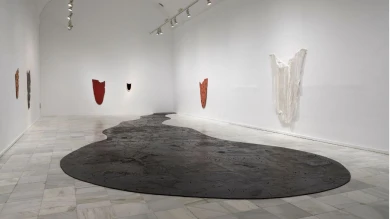
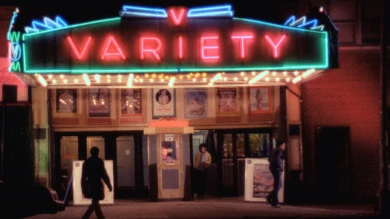
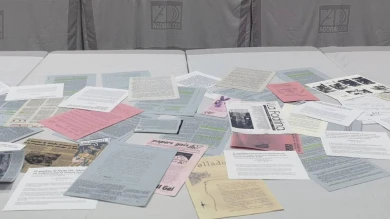
![Miguel Brieva, ilustración de la novela infantil Manuela y los Cakirukos (Reservoir Books, 2022) [izquierda] y Cibeles no conduzcas, 2023 [derecha]. Cortesía del artista](https://recursos.museoreinasofia.es/styles/small_landscape/public/Actividades/ecologias_del_deseo_utopico.jpg.webp)
![Ángel Alonso, Charbon [Carbón], 1964. Museo Reina Sofía](https://recursos.museoreinasofia.es/styles/small_landscape/public/Actividades/perspectivas_ecoambientales.jpg.webp)